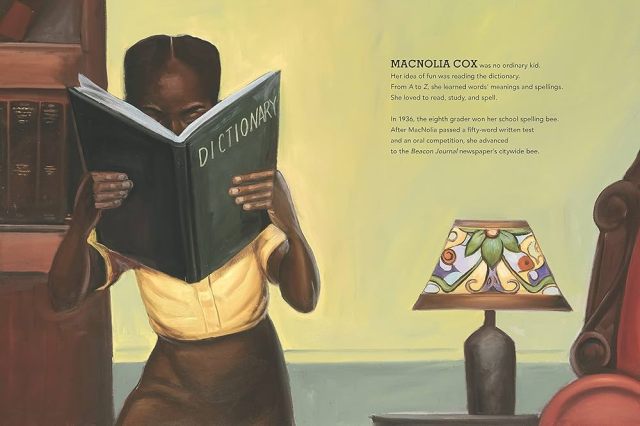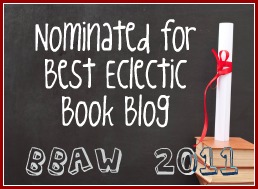In a Foreword, Weatherford relates that spelling bees have not always been open to Blacks in segregated areas in the US. In 1908, a 14-year-old Black girl from Ohio led her team to victory in a nationwide spelling bee, and whites were angry. Thereafter, Blacks were barred from many local spelling bees, even in the North. She writes: “There would not be another Black finalist at a national spelling bee until 1936. This is her story.”
Weatherford uses a call and response technique in the style of a spelling bee to tell it. She begins with Macnolia’s love of words, and how “her idea of fun was reading the dictionary.”
In 1936, eighth grader MacNolia Cox was able to enter the Akron, Ohio, spelling bee and won. Her prize was 25 dollars and a trip to the National Spelling Bee in Washington, D.C. She also received two dictionaries to study. But there were race-related barriers ahead. When the train with MacNolia and her mother reached the Maryland state line, the two were forced to move to the Blacks-only car. In D.C., they had to stay with a Black doctor because the hotel for the spelling contestants was for whites only. At the spelling bee banquet, they weren’t even allowed on the elevator and had to take the stairs, and they were seated apart from the white families.
The next day MacNolia and the only other Black contestant, Elizabeth Kenney from New Jersey, had to enter the ballroom through a back door and sit separately from other spellers. But MacNolia, Weatherford writes, “remained calm and nailed word after word. Can you spell focus F-O-C-U-S.”
When MacNolia advanced to the final five, the judges, all white Southerners, “were becoming visibly uncomfortable,” as recorded by Mabel Norris, a reporter who wrote about the bee for The Akron Beacon Journal. They then gave her a word not on the official word list and one she hadn’t studied: “nemesis.” It was listed as a proper noun in MacNolia’s dictionary, as it referred to a Greek goddess – and therefore was not supposed to be part of the spelling bee. (Can you spell unfair U-N-F-A-I-R?)
MacNolia misspelled it, and the judges ruled her out. Still, she made history by becoming a finalist, and she did take home a 75 dollar prize. Weatherford writes:
“Even though she didn’t win the championship, MacNolia had proven that African American students are as smart as anyone and can compete and excel when given a level playing field. That was MacNolia’s triumph.”
Weatherford adds an Epilogue that fills in details about MacNolia’s life after the spelling bee. She could not afford to attend college and ended up working as a maid. She died in 1976 at age 53.
Weatherford also notes that “like segregated schools, local spelling bees were slow to integrate. But as other racial barriers fell, local spelling bees opened to African Americans.”
In 2021, the author observes, a 14-year-old became the first African American to win the Scripps National Spelling Bee. That same year, the UA Senate passed a resolution honoring MacNolia’s life, legacy, and achievements.
A Select Bibliography concludes the book.
Award-winning illustrator Frank Morrison has collaborated often with Carole Boston Weatherford. His website points to the hip-hop cultural notes that can be seen through Morrison’s work, “which has been dubbed a mash-up of urban mannerism, graffiti and abstract contemporary, and reflects deeply on the lost of human stories from past eras.” Morrison cites the importance of both Ernie Barnes and Annie Lee in his own work, influences you can see in his elongated figures and depiction of body language to convey emotion.
Evaluation: This story is both inspiring and infuriating, as are the stories of many who have been discriminated against.
Rating: 4/5
Published by Candlewick Press, 2023











